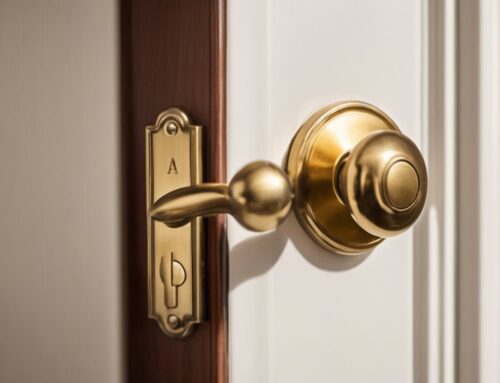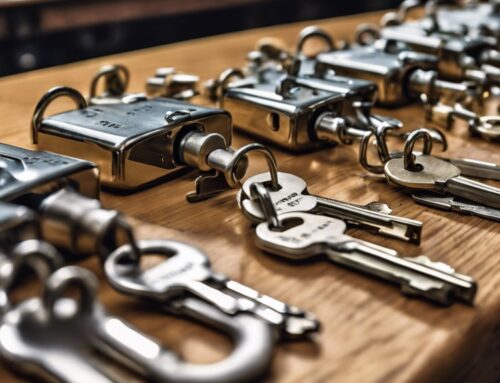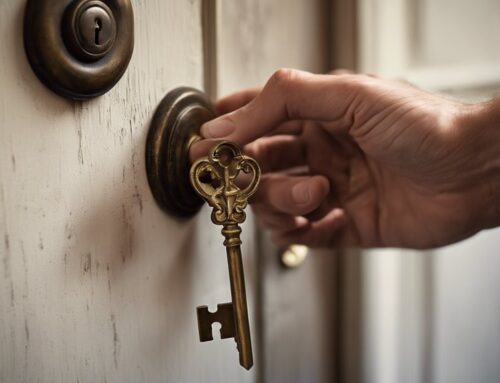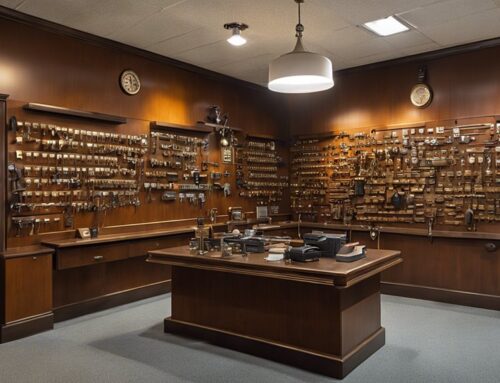As a business owner in Illinois, you need to understand the commercial lock standards that impact your operations. Compliance with NFPA 101 and other regulations isn't just about staying legal; it's about ensuring the safety and security of your employees and customers. From the types of locks you can use to egress requirements for exit doors, there's a lot to navigate. Are you prepared to meet these standards, and more importantly, what could the consequences be if you don't? The answers might be more critical than you think.
Key Takeaways
- Compliance with NFPA 101 and local regulations is mandatory for fire safety in commercial settings in Illinois.
- Exit doors must allow free egress without keys, and corridors should be at least 36 inches wide.
- Double or single cylinder deadbolts with a throw of at least 3/4 inch are required for secure locks.
- Business owners must use licensed locksmiths to ensure compliance with safety and regulatory standards.
- Regular training and drills for staff enhance preparedness and reflect a commitment to safety in emergencies.
Compliance With NFPA Standards
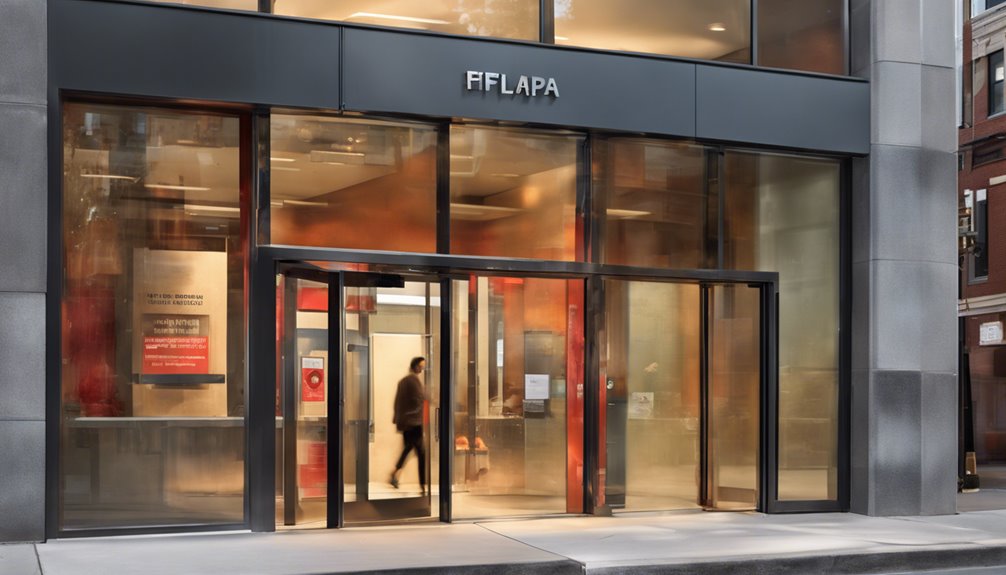
In Illinois, compliance with NFPA standards, particularly the 2015 edition of NFPA 101, is essential for guaranteeing fire safety in commercial buildings. The Illinois Office of the State Fire Marshal enforces these standards with specific modifications that many businesses must adopt. Understanding these codes is foundational for safeguarding lives and property. Additionally, Illinois law specifies the requirements for lock changes in rental properties, highlighting the importance of tenant safety.
One significant aspect of NFPA 101 is its emphasis on fire sprinkler systems, which reduce fire hazards and protect occupants in emergency situations. Compliance also governs the locking mechanisms of egress doors. Each door must allow access from the inside without a key or tool, facilitating swift exit during an emergency. Furthermore, all licensed locksmiths in Illinois must adhere to stringent regulations to ensure trustworthy services.
Additionally, doors can't compromise their fire ratings when modified, and existing door hardware must remain intact. This guarantees that panic hardware functions correctly and maintains the structural integrity necessary for fire safety.
Training is equally essential. Your staff must know how to use these locking mechanisms during emergencies, so regular drills are imperative. These drills not only familiarize employees with procedures but also keep everyone alert to potential adjustments in NFPA codes, as enforced by the OSFM.
Local building officials and the OSFM conduct inspections to guarantee your business adheres to these standards. Non-compliance can lead to substantial issues, so it's critical to stay informed about administrative regulations.
Prioritizing NFPA compliance isn't just about following rules; it's about creating a secure environment where people can thrive freely and safely.
Types of Permitted Locks
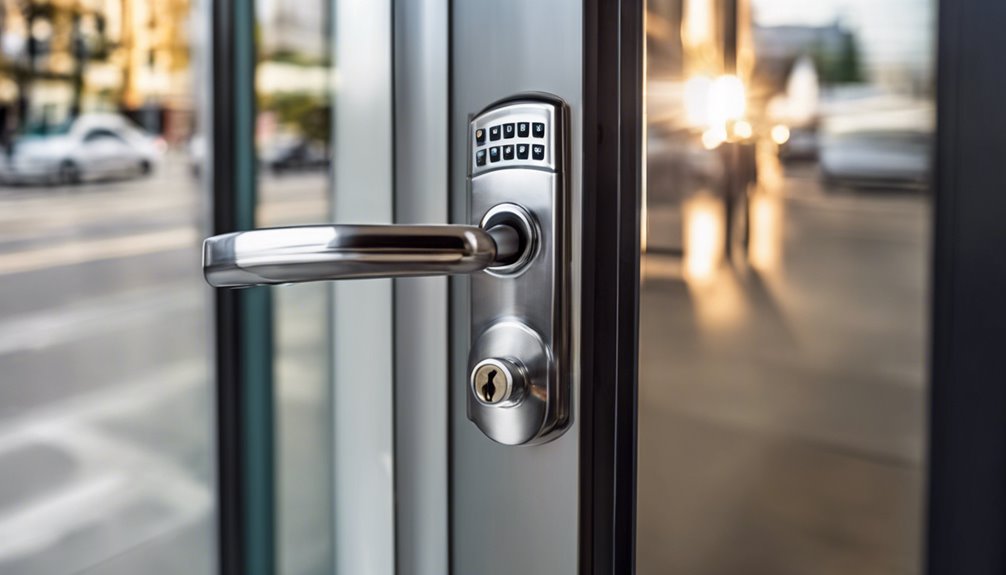
Understanding the types of permitted locks in Illinois is essential for ensuring compliance with safety regulations and enhancing the security of commercial buildings. When exploring lock options, it's vital to select mechanisms that not only meet legal requirements but also support quick egress during emergencies. Furthermore, as Illinois is set to eliminate locksmith licensing requirements in 2029, business owners should be diligent in selecting qualified locksmiths who understand these standards. All locksmiths should be familiar with essential lock safety standards to effectively comply with state regulations.
Permitted locks must enable access from the inside without any specialized knowledge or tools. Additionally, they should engage without requiring you to open the door first. To clarify what you should focus on, here are some key points to remember:
- Locks must be no more than four feet off the floor, ensuring accessibility for everyone.
- Any locking means can't interfere with existing door closing or safety hardware.
- The lock must allow access for designated personnel and emergency responders. Moreover, landlords in Illinois must be aware of their responsibilities regarding rekeying locks if a security concern arises.
However, certain lock types are strictly prohibited under the regulations. For example, you can't use bolt locks, slide bolts, or any security systems requiring multiple motions to access.
This redundant complexity could compromise safety, particularly in an emergency situation.
Exterior Door Security Requirements
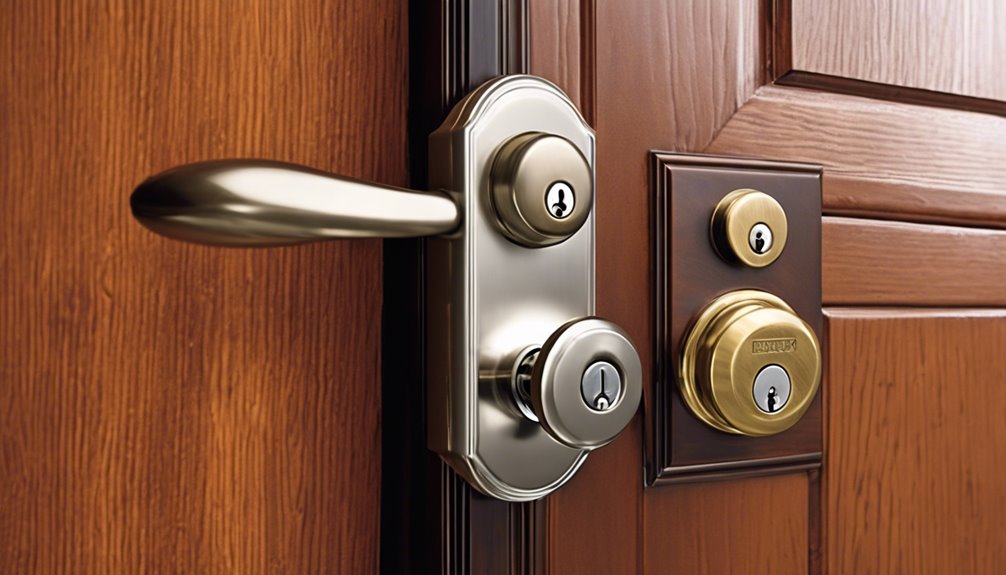
Guaranteeing robust security for exterior doors is crucial, as these entry points are often the first line of defense against unauthorized access. Adhering to set standards not only protects your assets but also supports a secure environment for your clients and employees. Here are some key aspects you should consider:
| Security Element | Requirements |
|---|---|
| Locking Mechanisms | Use double cylinder dead bolts or single cylinder dead bolts without a turn piece, with a minimum throw of 3/4 inch. |
| Cylinder Protection | Cylinders must resist gripping by pliers or wrenching devices. |
| Hinge Security | Install at least two hinges, secured with non-removable pins. |
| Illumination | A minimum 20-watt bulb must illuminate all exterior doors. |
| Address Identification | Confirm occupancies' numbers are visible from the street, at least three inches tall. |
Each of these requirements is designed to strengthen your exterior doors. For instance, selecting the proper locking mechanism, such as hardened steel dead bolts, greatly decreases the likelihood of forced entry. Additionally, effective illumination around doorways not only discourages intruders but enhances visibility for patrons. It's also important to remember that adherence to exit door regulations directly contributes to the overall safety and security of your business environment. Additionally, familiarize yourself with Illinois regulations for smart locks, as they are increasingly popular among commercial establishments. Ensuring compliance with key duplication laws can further enhance the security of your premises by preventing unauthorized copying of your keys. Don't forget to reinforce hinges and incorporate visible address numbers, as they play a crucial role in safety and security.
Egress Requirements for Businesses
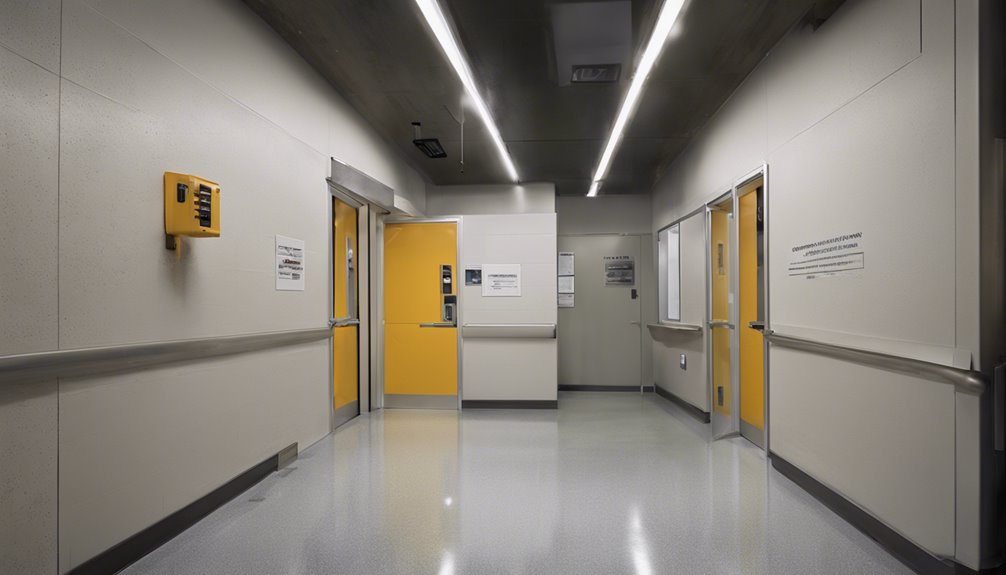
[Egress requirements for businesses play an essential role in ensuring the **safety of occupants** during emergencies. Understanding and implementing these standards not only protects lives but also fosters a sense of security and responsibility in your business environment. Here are key aspects to reflect upon:]
- Swift evacuations save lives: Efficient egress can mean the difference between safety and tragedy.
- Clear pathways create confidence: A well-planned exit system reassures occupants they can escape swiftly if needed.
- Compliance reflects commitment: Adhering to egress regulations shows your dedication to safety and corporate ethics.
In Illinois, multiple exit doors are required, especially in commercial spaces with higher occupancy loads. Exit doors must swing outward and be equipped with hardware like panic bars, ensuring quick access for everyone. Additionally, if law enforcement is involved in an evacuation, they may require the assistance of a locksmith to ensure access through secured areas, highlighting the importance of locksmiths in eviction processes. Moreover, proper hardware installation can prevent delays in emergency situations, emphasizing the role of licensed professionals in maintaining compliance.
It's vital that locks don't restrict exit from the inside with keys or tools. Additionally, the width of egress corridors must accommodate the number of occupants, typically a minimum of 36 inches for smaller groups.
Lighting and smoke control in these areas are essential for visibility during crises. The travel distance to an exit shouldn't exceed 75 feet—115 feet if your building has a sprinkler system.
Enforcement and Responsibilities
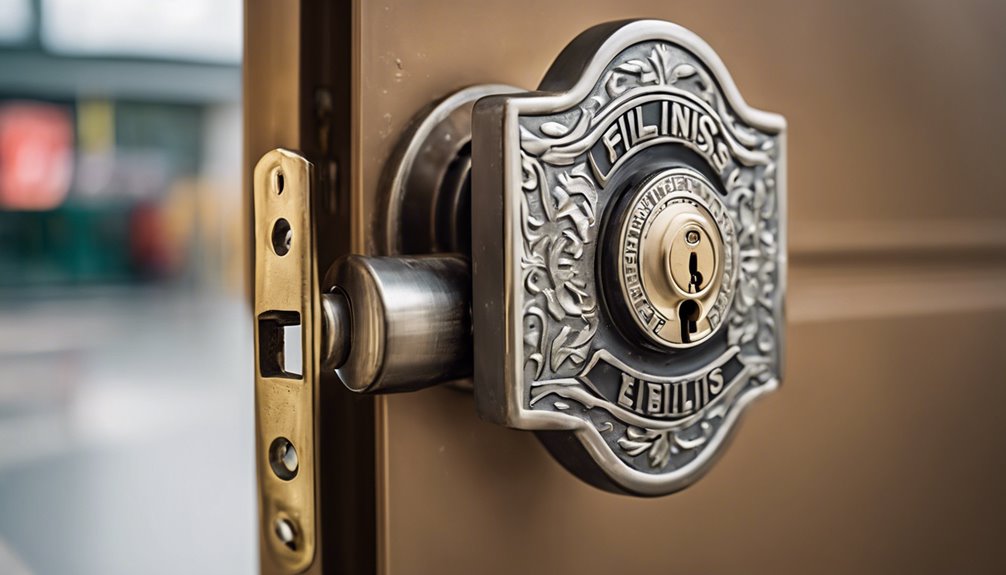
While many businesses prioritize safety standards, the enforcement of commercial lock regulations in Illinois rests on various agencies tasked with oversight. The Illinois Department of Financial and Professional Regulation (IDFPR) is primarily responsible for overseeing locksmith licensing and regulation. Local building officials and the Office of the State Fire Marshal (OSFM) also play essential roles in enforcing general safety codes concerning locks. Moreover, it is essential to ensure that all locksmiths complete proper training standards to guarantee their competency and reliability.
As a business owner, you'll need to understand the current regulatory framework, which mandates that licensed locksmiths pass an authorized exam, undergo background checks, and demonstrate good moral character. Failure to comply can lead to significant penalties, including fines up to $15,000 for false advertising. Note that the IDFPR can administer these penalties, conducting hearings and adjudicating disputes.
However, the landscape is shifting; the licensing law is set to sunset in January 2029, which may diminish strict regulatory enforcement. While the goal is to lower barriers for new locksmiths, this change could risk consumer safety. The potential absence of rigorous licensing may lead to unregulated services, heightening the chances of encountering unreliable locksmiths. Engaging in unauthorized locksmithing can result in severe legal repercussions and jeopardize your business's integrity.
Moving forward, your responsibility includes ensuring compliance with existing regulations. Even after the sunset of the current licensing framework, maintaining high standards for locksmith services will be vital.
You'll want to be vigilant about hiring licensed professionals, as the forthcoming regulatory void may complicate consumer protection efforts.
Frequently Asked Questions
What Are the Consequences for Non-Compliance With Commercial Lock Standards?
Non-compliance with commercial lock standards can lead to significant consequences.
You might face hefty financial penalties that increase with repeated violations. Your operations could experience disruptions, resulting in lost productivity that hampers your business goals.
Legal actions can arise, potentially involving lawsuits or criminal charges.
Most importantly, your company's reputation and customer trust could suffer, making it challenging to maintain loyalty and sustain long-term growth in a competitive market.
Can Businesses Use Biometric Locks for Egress Doors?
Think of biometric locks as the keyless freedom gate to your premises. You can use them for egress doors, but they must guarantee quick and unobstructed exit paths.
The releasing mechanism needs to be accessible from inside without excessive effort, aligning with safety codes. A swift response during emergencies is paramount, so make certain you understand and properly implement the required standards to balance security and easy evacuation for everyone inside.
How Often Should Locks Be Inspected for Compliance?
You should inspect locks regularly to guarantee they comply with safety and security standards.
The frequency often depends on the lock type and usage; for instance, high-traffic areas usually need more frequent checks.
Keeping documentation of these inspections is essential, as it provides evidence of compliance.
Regular assessments help you quickly identify and address wear and tear, making sure your locks remain functional and secure, ultimately protecting your business and its assets.
Are There Specific Regulations for High-Security Facilities?
When it comes to securing high-security facilities, the lock standards act like a fortress wall, safeguarding against unwanted breaches.
You must comply with strict regulations designed to prevent unauthorized access, ensuring each door locks effectively.
Consider using hardened steel deadbolts and secure cylinders to thwart tampering.
Adequate emergency measures should maintain access for first responders while keeping intruders at bay.
When you set up these checks, you maximize both safety and freedom for your operations.
What Should I Do if My Locks Fail During an Emergency?
If your locks fail during an emergency, first identify the issue and assess its urgency.
Contact a 24-hour emergency locksmith service, providing specifics about the failure. Verify the locksmith's qualifications.
While waiting for assistance, consider temporary security measures and alternative access points.
Regular inspections of your locks can prevent future incidents, so schedule maintenance proactively.
Compliance with safety codes is essential, guaranteeing your premises remain secure and accessible during emergencies.
Conclusion
As you navigate the complexities of commercial lock standards in Illinois, remember that compliance is not just a legal obligation—it's a commitment to safety. Failing to adhere to these regulations could put your business, employees, and customers at risk. What happens if you overlook a detail? The consequences could be dire. Fortify your knowledge and guarantee your locks meet these essential standards. The security of your establishment hinges on your proactive measures. Will you rise to the challenge?


